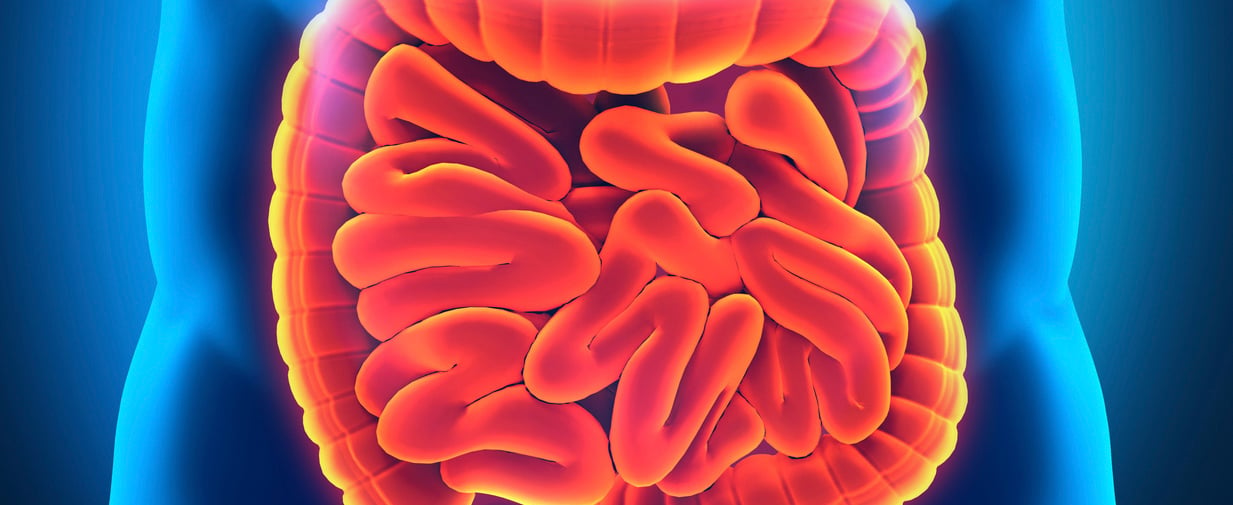The fact that a high-dose combination of the essential oils of peppermint (Mentha×piperita L.) and caraway (Carum carvi L.) can have a symptom-relieving effect on gastrointestinal complaints has been empirically proven several times. There is evidence that patients with inflammatory bowel disease (IBD) may also benefit. To find out more about specific anti-inflammatory effects, an animal study was conducted. Menthacarin proved superior to the control group with respect to several inflammatory markers.
The analgesic, antispasmodic, and antimicrobial effects of menthacarin, a high-dose mixture of peppermint and caraway oil, are well documented for functional gastrointestinal complaints. of The drug Carmenthin® (menthacarin) is currently licensed in Switzerland for adults and adolescents 12 years of age and older for the treatment of mild cramps, bloating, epigastric pain and flatulence [1,2]. There is evidence that menthacarin also produces beneficial therapeutic effects in inflammatory bowel diseases (IBD) such as ulcerative colitis and Crohn’s disease [3]. Several previous studies indicate anti-inflammatory effects [4–6].
In mouse model, menthacarin shows anti-inflammatory effects in colitis
To find out more details about possible anti-inflammatory effects in colitis, an animal study was conducted [7]. C57BL/6 mice received menthacarin at doses of 10, 30, 60, and 120 µg/g body weight (bw) for 8 days during which colitis was induced using 2% dextran sodium sulfate (DSS); control groups received 0.2% agar, 10 µl/g bw, respectively. Experimentally induced colitis was monitored by measuring body weight (bw) and colonoscopies. Menthacarin-treated animals exhibited improved macroscopic and microscopic parameters and less body weight reduction during the course of colitis compared with controls. Colon tissue was examined by immunohistochemistry and ELISA. This showed that menthacarin altered the cytokine profile in the colon toward an anti-inflammatory phenotype. The following is an overview of the most important results of all outcome parameters measured:
Change in cytokine profile: The following cytokines were present to a lesser extent in the colon of animals treated with menthacarin: TNF-α, IL-6, IL-1β, TGF-β. In contrast, the anti-inflammatory/immunoregulatory cytokine IL-10 was present at higher levels compared with the control group.
Improvement of histopathological damage: Colon tissue from animals in the treatment arms showed significantly less histopathological damage at doses of 30 µg/g bw* and higher compared to controls(n=14), but no difference was detectable at a menthacarin dose of 10 µg/g bw (n=8).
* 30 µg/g bw (n=10), 60 µg/g bw (n=14), and 120 µg/g bw (n=8).
Reduction of macroscopic damage: In the colon of the test animals of the control groups, a deterioration of macroscopic damage was manifested between day 4 and 7 as shown by mini-endoscopic examinations. Mice treated with menthacarin showed significantly lower signs of inflammation at day 4 and 7 compared with controls (p<0.05; n=10-16).
In summary, these findings demonstrate that experimentally induced colitis in laboratory mice is attenuated by treatment with menthacarin, as evidenced by various immunopathological and histopathological studies. The authors suggest that menthacarin may be a useful add-on treatment option in people with IBD.
|
CED: Phytopreparations as well-tolerated add-on therapy option The incidence of C. ulcerosa and Crohn’s disease has increased over the past decade in Europe and worldwide [9]. The pathogenesis of IBD is not fully understood and there is currently no curative treatment option. Various anti-inflammatory agents (e.g., cortisone, aminosalicylate) and immunosuppressive drugs (e.g., azathioprine, methotrexate, and ciclosporin) are used to reduce symptoms and maintain remission, and several new targeted antibodies are available. However, these treatment options are accompanied by side effects, some of which are considerable. In addition, there are patients who do not respond adequately to the appropriate therapies or who develop resistance to certain agents [8,10]. In summary, there are “Unmet needs” and innovative treatment strategies are needed. There is evidence from several studies that patients may benefit from phytopharmacological medicines as add-ons [8–10]. |
Human experiments Menthacarin improves quality of life in IBD
The main symptoms of IBD are diarrhea, as well as bloody, mucopurulent stools and abdominal pain and cramps. In an im United European Gastrology Journal published human experimental multicenter RCT, a 4-week treatment with menthacarin (2×1 capsule/d) as an add-on to standard therapy resulted in significantly improved health-related quality of life (HRQoL) in CED patients in a placebo comparison [3]. HRQoL was assessed using the Inflammatory Bowel Disease Questionnaire (IBDQ) [11] at baseline and after week 4, showing a significant improvement in the total IBDQ score by 25.6±30.2 points under treatment with menthacarin (n=61) compared to 11.0±22.5 points in the placebo group (n=64) (p=0.0012).
Literature:
- Specialized information: www.compendium.ch, (last accessed 10/15/2021).
- Madisch A, et al: Internist 2015; 56, (Suppl. 1): 28.
- Engel MA, Stracke B: United European Gastroenterology Journal 2016; 4(5), A618.
- Da Rocha ML, et al:. J Nat Med 2013; 67, 743-749.
- Liu Z, et al: Food Chem Toxicol 2015; 82: 12-18.
- Rozza AL, et al: The gastro-protective effect of menthol: involvement of anti-apoptotic, antioxidant and anti- inflammatory activities. PLoS One 2014, https://doi.org/10.1371/journal.pone.0086686
- Alliger K, et al: Phytomedicine 2020; 77, October 2020, 153212.
- Currò D, Pugliese D, Armuzzi A: Front Pharmacol 2017; 8: 1-19.
- Mak WY, et al: J Gastroenterol Hepatol 2019, https://doi.org/10.1111/ jgh.14872.
- Fakhoury M, et al: J Inflamm Res 2014; 7: 113-120.
- Guyatt G: Gastroenterology 1989; 96: 804-810.
HAUSARZT PRAXIS 2021; 16(10): 25











